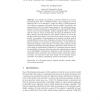Free Online Productivity Tools
i2Speak
i2Symbol
i2OCR
iTex2Img
iWeb2Print
iWeb2Shot
i2Type
iPdf2Split
iPdf2Merge
i2Bopomofo
i2Arabic
i2Style
i2Image
i2PDF
iLatex2Rtf
Sci2ools
CORR
2010
Springer
2010
Springer
A Proof Theoretic Analysis of Intruder Theories
We consider the problem of intruder deduction in security protocol analysis: that is, deciding whether a given message M can be deduced from a set of messages under the theory of blind signatures and arbitrary convergent equational theories modulo associativity and commutativity (AC) of certain binary operators. The traditional formulations of intruder deduction are usually given in natural-deduction-like systems and proving decidability requires significant effort in showing that the rules are "local" in some sense. By using the well-known translation between natural deduction and sequent calculus, we recast the intruder deduction problem as proof search in sequent calculus, in which locality is immediate. Using standard proof theoretic methods, such as permutability of rules and cut elimination, we show that the intruder deduction problem can be reduced, in polynomial time, to the elementary deduction problems, which amounts to solving certain equations in the underlying i...
| Added | 01 Mar 2011 |
| Updated | 01 Mar 2011 |
| Type | Journal |
| Year | 2010 |
| Where | CORR |
| Authors | Alwen Tiu, Rajeev Goré, Jeremy E. Dawson |
Comments (0)

